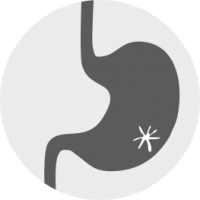Knowledgebase
Scientifically “in-vitro” laboratory tested with over 55 000 happy customers since 2006.
Matula Tea is a 100% natural product and may be taken safely with other medications. Scientifically “in-vitro” laboratory tested shows anti-bacterial properties of Matula Tea eradicate all strains of Helicobacter Pylori.
Prolonged usage of Matula Tea has shown to be very beneficial to people who are suffering from Candida overgrowth in the intestines as well as effectively relieving symptoms associated with acid reflux (GERD).
Regulates the production of stomach acids which promotes the healing of heartburn and reflux disease.
- Aids in rebuilding the protective mucus lining of the stomach.
- Promotes the healing of damaged tissues.
- Non Toxic – it is as safe as a normal cup of herbal tea.
Laboratory “in-vitro” Tests
Professor Patrick JD Bouic Ph.D from the Dept. of Medical Microbiology at the University of Stellenbosch did the laboratory “in-vitro” testing for Matula Tea and was most impressed at how effective Matula Herbal Tea proved itself to be in the eradication of H. pylori.
His conclusion was that Matula Herbal Tea displays potent activity against the bacteria H. pylori, the main cause of stomach ulcers and gastric cancer. In fact the results are so conclusive that Professor Bouic has kindly given Matula Herbal Tea his personal endorsement.
The Laboratory Test Results Explained…
The tests show that at a concentration of 50% the inhibition of Helicobacter pylori bacterium is 93%.
So what does this mean?
A 50% concentration means that the study used two identically equal portions, one portion containing Helicobacter pylori bacterium and the other exact sized portion containing Matula. Inhibition is the amount of the bacterium that was killed off when the two portions are brought in contact with each other.
Matula Herbal Tea is effective at killing off 93% of Helicobacter pylori each and every time that Matula comes into contact with Helicobacter pylori in your digestive system.
Now consider the total effect when you are taking Matula Herbal Tea twice daily and it is effectively killing off 93% of the Helicobacter pylori with each dose.
After 30 days (60 doses) you can imagine just how incredibly effective Matula Herbal Tea really is. It gives Helicobacter pylori virtually no chance of survival or to re grow.
How to use the tea….
Matula Tea should be taken twice a day, morning and evening . Pour 150 – 200ml ( 4 – 7 fluid oz ) of boiling water in a cup with a bag of Matula Tea , try and steep it for 15 – 20 minutes – too try and get the strongest mixture from the tea bag . With each sip , swirl the tea around your mouth a bit before swallowing . A large percentage of H. Pylori may be found in the mouth and dental spaces.
Do not use a microwave oven to boil the water for the tea or to reheat the tea .
Do NOT take any liquids , probiotics , supplements , vitamins or food for an hour either side of taking the tea .
Do NOT take any vaccines or antibiotics while on the tea .
Matula Herbal Tea Ingredients:
The primary constituents of this herbal tea formula are as follows:
Oleo Europaea & Oleo Africana (Scientific name) Oleaceae (Family name)
Olive (Common name) – The Leaf of the plant are used
Clycyrrhiza Glabra (Scientific name) Fabaceae (Family name)
Cyclopia Intermedia (Scientific name) Fabaceae (Family name)
Honeybush (Common name) – The Leaf of the plant are used
Aspalathus Liniar (Scientific name) Fabaceae (Family name)
Rooi Bos (Common name) – The Leaf of the plant are used
Psidium Guajave (Scientific name) Myrthaceae (Family name)
Wild Guava (Common name) – The Fruit & Leaf of the plant are used
Syzygium Cordathus (Scientific name) Myrthaceae (Family name)
African Water Berry (Common name) – The Leaf of the plant are used
Information disclaimer
The results of a Matula Herbal Tea treatment can vary from person to person, due to various differences in the severity of the Helicobacter Pylori infection and the general health and wellbeing of each person. To read the full disclaimer please click here.


